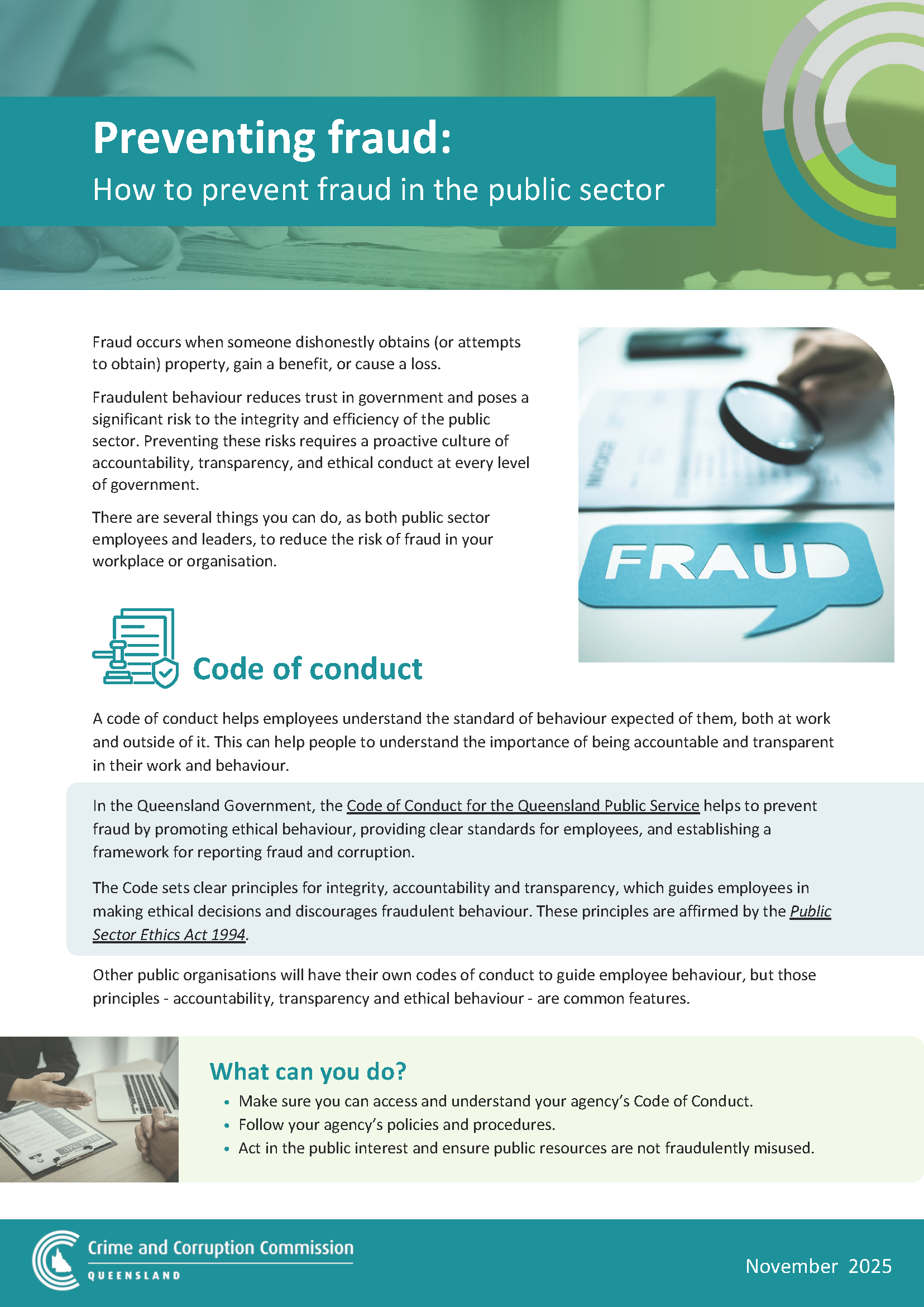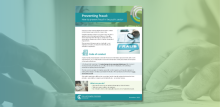It identifies common risks across the public sector and provides guidance and tips for employees and leaders to mitigate these risks. Knowing how to prevent fraud in the public sector can reduce the risk of fraudulent behaviour in your workplace or organisation. View a PDF version of this information that you can print or share. |
Fraud occurs when someone dishonestly obtains or attempts to obtain property, gain a benefit, or cause a loss.
Fraudulent behaviour reduces trust in government and poses a significant risk to the integrity and efficiency of the public sector. Preventing these risks requires a proactive culture of accountability, transparency, and ethical conduct at every level of government.
There are several things you can do, as both public sector employees and leaders, to reduce the risk of fraud in your workplace or organisation.
Code of conduct
A code of conduct helps employees understand the standard of behaviour expected of them, both at work and outside of it. This can help people to understand the importance of being accountable and transparent in their work and behaviour.
In the Queensland Government, the Code of Conduct for the Queensland Public Service helps to prevent fraud by promoting ethical behaviour, providing clear standards for employees, and establishing a framework for reporting fraud and corruption. The Code sets clear principles for integrity, accountability and transparency, which guides employees in making ethical decisions and discourages fraudulent behaviour. These principles are affirmed by the Public Sector Ethics Act 1994. |
Other public organisations will have their own codes of conduct to guide employee behaviour, but those principles – accountability, transparency and ethical behaviour – are common features.
What can you do?
- Make sure you can access and understand your agency’s Code of Conduct.
- Follow your agency’s policies and procedures.
- Act in the public interest and ensure public resources are not fraudulently misused.
Internal controls and processes
Having an effective fraud and corruption control system in place is a central strategy in preventing and mitigating against the risk of fraud and corruption from occurring.
Such systems include fraud and corruption control policies, plans and frameworks, along with risk and integrity frameworks, and regular education and training on fraud risk, which when integrated help to protect public assets and resources from misuse.
Conducting a detailed risk assessment helps to identify areas of fraud and corruption vulnerability, gaps in controls, and where policies, procedures and tools are required to manage these risks.
The Queensland Audit Office (QAO) has self-assessment tools to help you to understand your agency’s potential exposure to fraud and identify areas for improvement.
What can you do?
- Know how to apply your agency’s fraud and corruption control policies and procedures.
- Regularly participate in fraud and corruption control education and training.
- Ensure controls and processes are in place to regularly check and monitor the use of public resources that may be at risk of fraud (e.g. asset registers, corporate cards, vehicle logs).
- Conduct a fraud risk assessment to identify gaps in controls and areas for improvement.
Positive workplace culture
A positive and ethical workplace culture can help reduce the potential for fraud in your organisation. Often, the first reports of resources being misused come from staff noticing something wrong and reporting it.
Public entities should promote a culture where staff feel safe and supported to report fraud and corruption – not as a replacement for formal monitoring strategies and systems, but as an important part of the fraud and corruption control system. A strong integrity culture sets behavioural expectations, reinforces accountability and builds collective resistance to unethical conduct.
A supportive, honest and transparent workplace encourages people to speak up. When staff act with integrity, report concerns, use resources responsibly, and uphold transparency, they are less likely to engage in fraud or corruption and will build public trust in the agency.
What can you do?
- Whether you are a leader or an employee, model integrity in your daily work by complying with laws, policies and procedures and acting ethically in all your dealings.
- Use public resources such as agency time, equipment and funds only for legitimate business purposes.
- Speak up and encourage others to report suspected fraud, corruption or unethical behaviour.
Audits and reviews
Regular audits and reviews are essential to reducing fraud and corruption across your agency.
They provide independent oversight of financial management, procurement, and decision-making processes. They also ensure transparency and accountability in the use of public resources and act as a strong deterrent. This can include financial audits (such as travel expenditures, procurement, or card purchases) or security audits (such as for site access or Information and Communications Technology).
Regular checkpoints help to assess the effectiveness of internal controls, identify weaknesses and support improvements. This strengthens governance and reduces opportunities for fraud and corruption. Something as simple as auditing stationery purchases or conducting performance reviews on time can help you identify potential issues.
It’s also important to regularly review the audit or process review itself, as well as the outcomes, to ensure that they remain relevant and effective.
What can you do?
- Be alert and responsive to new or changing risks that could create opportunities for fraud in your workplace, such as new technologies, poor practices, or external associations.
- Conduct regular audits of high-risk processes and decisions and treat audit findings as opportunities to strengthen systems.
- Carry out random fraud spot-checks, such as timesheet approvals or finance system access.
Procurement processes
Public spending, whether it’s being used to deliver major infrastructure projects or the team stationery order, can be vulnerable to fraud and corruption.
Maintaining proper procurement policies and procedures, and where relevant following the Queensland Procurement Policy, can reduce the risk of fraud. This also helps to ensure that the procurement process remains fair and transparent, and that public funds are being used wisely.
What can you do?
- Comply with your organisation’s procurement policies, thresholds and approval delegations
- Ensure you are sufficiently trained and understand procurement and contract guidelines.
- Use clear, documented evaluation criteria and avoid biased or subjective decision-making.
- Disclose any personal, financial, or professional relationships with suppliers, bidders or contractors.
Training and education
Our staff are our greatest protective assets. Ensuring they are trained and aware of the signs of fraud and how to report it is one of the most effective tools available to help to prevent fraud from occurring.
Without training it’s easy for people to miss the warning signs, such as someone providing false information, misusing resources or failing to declare a conflict of interest.
Providing regular training on all procedures and compliance measures, as well as teaching people how to identify and prevent fraud, can be time-consuming for both organisations and staff. However, these measures are essential to upholding the standards and principles required from all public sector employees.
What can you do?
- Take ethics, integrity, and fraud awareness training seriously - don’t treat it as a checkbox activity.
- Put your training into practice in your daily work - particularly around risk awareness, reporting, and ethical decision-making.
- Demonstrate what you’ve learned by making integrity visible in your actions and decisions.
Further information and resources
|

 This factsheet provides information about how to prevent fraud in the public sector.
This factsheet provides information about how to prevent fraud in the public sector.